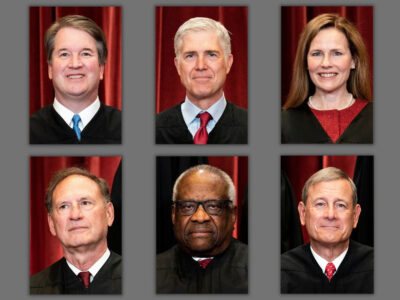U.S. Supreme Court Declines to Revive Challenge to Oregon Clean Fuels Program
Legal Challenges to Oregon & California Vehicle Fuel Carbon-Intensity Standards Close to the End of the Line, Clearing Path Forward to Transformative Reductions in Greenhouse Gas Emissions from Transportation Sector
In this post, we continue our discussion of California’s Low-Carbon Fuel Standard (LCFS), which we introduced in our post on October 4, 2018. This is third in that series.
This past Monday, the U.S. Supreme Court denied review of a federal appeals court decision upholding the legality of Oregon’s Clean Fuels Program. That decision finally frees Oregon’s program from uncertainty from what was seen as a significant legal challenge. The program, modeled after the similar California Low Carbon Fuel Standard developed by the California Air Resources Board (ARB), aims to dramatically reduce greenhouse gas emissions from transportation fuels. These innovative programs are designed to spur transformative changes in how we power our vehicles. The Supreme Court’s denial of review in this case brings the programs one step closer to being free of legal challenges, and is good news for efforts to move the transportation sector off of petroleum.
These clean-fuel programs are designed to incentivize lower emissions from fuels not just when they are burned in the vehicle, but through their entire life cycle, including extraction, production, transport, and consumption. The programs’ strategy is to support the market conditions to replace current carbon-based vehicle fuels with new low-carbon energy sources over the coming years. (My colleague Ted Parson and I have written extensively about California’s program, both analyzing and making recommendations about it structure, and explaining why policy critiques of the program are wrong.) While both states’ programs are active and have been well-functioning, court challenges created some uncertainty about their stability, and reduced the effectiveness of California’s program in the early years. Going forward, the legal challenges should no longer induce uncertainty, slow down progress, or threaten the stability of the programs. There is now one remaining legal proceeding in progress: challengers of the California program still have time to file one more petition in the Supreme Court, due in about a month, as a last-ditch effort to derail the program. Such a petition would be extraordinarily unlikely to prevail, as I detail below.
The legal challenges have taken two main forms, which I will recap here. (Warning: some of the discussion below is in the legal weeds!)
Legal Challenges Under Federal Law
First, some opponents of California’s Low-Carbon Fuel Standard (LCFS) and Oregon’s Clean Fuels Program (CFP) brought legal claims under the U.S. Constitution that could have been devastating to the clean-fuels policy, had they been successful. Their claims included the assertion that the programs violate the Constitution’s “dormant Commerce Clause” doctrine, and that federal laws preempt the state programs. These claims, if successful, could have made it virtually impossible for a state to develop and implement a program that made regulatory distinctions among fuels based on lifecycle GHG emissions. The Supreme Court’s denial of review may have finally puts those claims to rest, though the American Fuel and Petrochemical Manufacturers’ Association and other trade associations have another month—until June 17—to file a petition asking the Supreme Court to review a related decision upholding California’s LCFS against constitutional challenges.
The dormant Commerce Clause doctrine forbids state or local governments from certain types of actions that disadvantage other states’ businesses for the gain of in-state business interests. Critics of the programs contended both California and Oregon violated this doctrine in two ways. First, they said the programs discriminate against out-of-state fuels, by assigning higher carbon intensity values to some out-of-state corn ethanol and, in the case of the original California program, to high-carbon-intensity crude oil. Second, opponents asserted that the programs regulate commerce entirely outside the state, through the market influence of the program on fuels produced in other states. An early decision by a federal district court accepted some of these arguments and temporarily cast doubt on the program’s legality, generating uncertainty about its future. But more recently, three Ninth Circuit decisions—covering different iterations of the California program as well as Oregon’s program—have now established the program does not run afoul of the Commerce Clause, because the carbon intensity calculations simply “reflect the reality of assessing and attempting to limit GHG emissions” and are not an impermissible attempt to discriminate against out-of-state products or to regulate business activities in another state. These appellate court decisions establish that the basic structure of this type of program—measuring or estimating the lifecycle emissions from a type of fuel, and favoring fuels with lower lifecycle emissions—is legally sound under the Commerce Clause.
Ethanol and petroleum producers also unsuccessfully argued that federal law preempted the LCFS, meaning that federal law leaves no room for states to lawfully implement their programs. These arguments took several forms. In California, they argued that LCFS implementation would interfere with the federal Renewable Fuel Standard and the Energy Independence and Security Act. Ultimately, the plaintiffs dropped these claims before they could be addressed by appellate courts. In the Oregon case, the opponents also contended the Clean Air Act preempted the CFS. They noted that the Clean Air Act preempts state regulation of vehicle fuels whose regulation the EPA Administrator has declared unnecessary, and argued that because the EPA declined to list methane (a component of natural gas fuels regulated under the CFP) as a “volatile organic compound” in an unrelated situation, Oregon was prohibited from enacting the CFS. The Ninth Circuit found this claim to be without any legal merit.
The Supreme Court’s denial of review in the Oregon case, affirming the Ninth Circuit’s decision that the program is lawful, comes close to ending the legal wrangling over the constitutionality of these programs for once and for all. If California litigants do not file a petition for review in the related California case by June 17, the legal challenges will end. And given the similarity of issues between the two cases and programs, the denial of review in the Oregon case seems to signal that the Court is extremely unlikely to review the California case, if a petition is filed. Closure of that case will end the legal uncertainty in the background to these programs, and may spur other states to enact similar programs.
Legal Challenges Under California State Law
Two court challenges to the LCFS in California state courts have finally come to a close, with the program surviving those efforts to derail it. These two California cases involved challenges to the adequacy of the program’s environmental impact analysis under the California Environmental Quality Act (CEQA). In the first case (POET I), an out-of-state corn ethanol producer and other plaintiffs argued that ARB violated California law in three ways: by approving the LCFS before completing its environmental analysis; by failing to assign responsibility for approving regulations to those conducting the analysis; and by improperly deferring enactment of measures to mitigate potential increases in nitrogen oxide (NOx) emissions caused by increased biodiesel use. In August 2013 the Court of Appeal directed ARB to set aside its approval of the LCFS and remedy the identified deficiencies by conducting a new environmental analysis. The court let the regulations remain in effect based on public interest in environmental protection. The result was that the implementation of the program was delayed, with less ambitious targets for reducing fuels’ carbon intensity.
In 2015, ARB re-adopted the LCFS regulations, with a new environmental impact analysis, in an effort to comply with the court’s mandate along with other program modifications. Plaintiffs then appealed again, arguing that the new analysis still did not adequately analyze the potential for increased NOx emissions, and thus did not comply with the order. The Court of Appeal issued its second opinion in POET I in May 2017. The Court found that the new environmental analysis did not correct all the prior CEQA violations with respect to diesel and diesel substitutes, so ARB had not complied with its writ of mandate. The Court ordered ARB to complete another new analysis, but found the regulations were on balance likely to be beneficial, and so limited its remedy—delaying the diesel component of the program for several months, while leaving all other LCFS regulations in effect unchanged. ARB completed its new analysis in late 2018 and adopted newly modified regulations, and the court approved the agency’s compliance.
In October 2015, while that appeal was pending in the Court of Appeal, the same plaintiffs filed a second suit (POET II), alleging procedural violations in adopting the revised 2015 regulations similar to those they previously alleged for the earlier regulations in POET I, as well as deficiencies in the new environmental analysis. In early 2018, the trial court dismissed the POET II case, finding that the resolution of the second appeal in POET I—requiring ARB to further revise its environmental review and regulations—mooted the claims against the revised regulations. An appeal of that decision was dismissed by the plaintiffs early in 2019, clearing the way for ARB finally to be free of litigation.
Overall, the Supreme Court’s denial of review brings the clean-fuels programs within one small step of being free from legal challenges. Assuming—as is extremely likely—the Supreme Court decides not to review the remaining 9th Circuit decision, this will be good news for efforts to transform how we power our vehicles in California, Oregon, and throughout the country.








Reader Comments